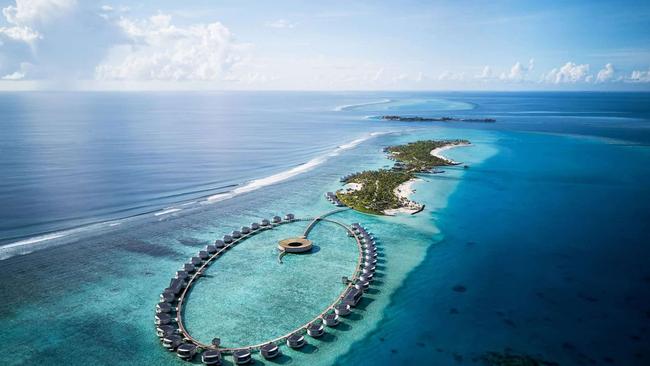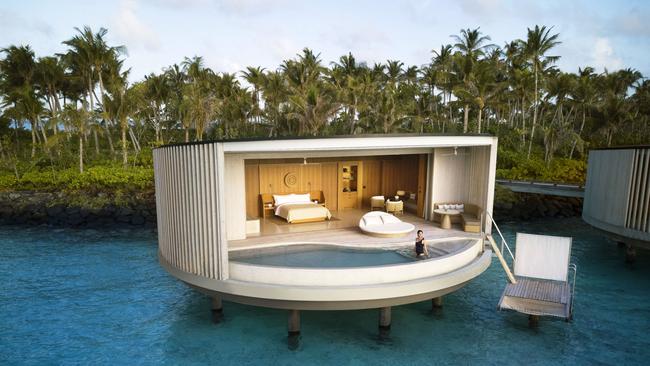Luxury Learning Vacations 2022: From the Maldives to the North Pole
On a trip to the new Ritz-Carlton Maldives resort, a traveller combines her pampering R&R with hands-on lessons on marine ecology.

The first time I took a biology class, I sat inside a drab, windowless lab room in my Phoenix high school. The last time, this past November, I was on a boat in the Indian Ocean as conservation biologist Sol Milne tried to convince me not to worry about swimming beside sharks.
Just as the mercury began plummeting in Chicago, where I live now, I’d travelled 9,000 miles and expended every possible Marriott Bonvoy point and air mile to meet a friend at the 100-villa Ritz-Carlton Maldives, Fari Islands for five days of sunshine and cerulean seas. What I hadn’t expected was a crash course in marine ecology. The resort, which opened last June on a man-made archipelago, is one of the hosts of the Ambassadors of the Environment program, developed by Jean-Michel Cousteau’s Ocean Futures Society and offered at a handful of Ritz-Carlton resorts. Activities vary by resort, with many geared to kids, but they all share an educational focus. At the Ritz-Carlton Maldives, the program includes complimentary lectures by Dr. Sol (as he’s called) about the sea life of the Indian Ocean, as well as outdoor excursions for additional cost. You can sign up for a snorkelling trip with Dr. Sol or a diving excursion with a naturalist and a “dive butler.” On some dive trips, guests strategically plant 3D-printed coral around the atoll in effort to seed a new reef.
After attending two of Dr. Sol’s lively lectures in the dive centre, I joined the biologist and a dozen other hotel guests on a half-day snorkelling excursion. Dr. Sol spent the hour-long boat ride over to the drop-off telling us about the devastating bleaching event that befell the Maldives’ reef in 2016. An unfortunate combination of rising sea temperatures, ocean acidification and a terrible El Nino year caused the coral to expel its algae, rendering those exoskeletons barren and white. Fish, lacking nutrients, had to find food elsewhere or perish. In 2019, the Maldives Coral Institute began a reef restoration project in some of the country’s protected marine areas. Dr. Sol told us that the efforts seem to be paying off and the reef is lumbering back to life.
I’ve always been intimidated by the ocean and more than a little afraid of what lurks beneath the surface. But when we finally donned our flippers and jumped off the boat, I was so busy seeking out all the creatures Dr. Sol had mentioned over the past few days that my initial dread dissipated. There went the grouper, the goon of the reef, who keeps the population under control. I spied a cleaner wrasse, one of the doctors of the sea, eliminating parasites from other fishes’ flesh. I cruised around the coral in search of mossy shades overtaking bare patches. I held my breath and dived down deep to look for sea cucumbers and sponges, who soak up marine toxins just as Chicago’s Waste Management picks up my urban trash. I even sought out black-tip sharks, who occupy the C-Suite of the reef, sacking the weak (by, you know, eating them). Sharks, I learned, have survived at least four major extinctions. They predate trees.
After decades of snorkelling reluctantly, I suddenly became hooked on it — not just to see more but to know more, which I now realise may be the real value of a learning vacation. Five days at a luxury resort may not be enough to ace AP Bio, but I can think of worse places to study.

Five-Star Field Trips
To take home more than a tan from a water-bound retreat, consider these new immersive programs offered by resorts and cruises.
Kokomo Island, Fiji
At this private island resort, encircled by the Great Astrolabe Reef, guests join marine biologists on snorkel trips and dives to help transplant live coral from seven nearby nurseries into a growing reef. They can also help with the resort’s mangrove reforestation project.
Conrad Bora Bora Nui Resort, French Polynesia
With its thatch-roof overwater and hillside bungalows, Conrad Bora Bora Nui Resort is situated off the coast of Motu To’opua, a small islet near Bora Bora. The resort’s resident marine biologist, Alice Carpentier, conducts research on manta rays through the Manta Trust Program. Since June 2021, Ms. Carpentier has been taking guests of all ages on half-day excursions to witness resident mantas making pit stops at coral gardens around the island where fish “clean” them of parasites, as she shares details on each individual’s behaviour, personality and potential.
Amanyara, Turks & Caicos
In partnership with the Phillip and Patricia Frost Museum of Science in Miami, this posh Caribbean resort recently launched a camp for kids ages 5 to 14. The Science Explorers and Environmental Keepers (SEEK) program focuses on coastal conservation and reef rescue and includes guided excursions like kayaking along the reef and through the mangroves searching for invasive species.
Ponant Cruises, Antarctica
The luxury hybrid electric polar ship Le Commandant Charcot launched in November, making voyages to Antarctica. Passengers can work with a team of scientists to collect data on water temperatures, salinity and health of sea life.
The Wall Street Journal.

To join the conversation, please log in. Don't have an account? Register
Join the conversation, you are commenting as Logout